Multi-tasking your morning routine with a tinted sunscreen can save time and help protect your skin from UV rays.
Our editors and experts handpick every product we feature. We may earn a commission from your purchases.Learn more.
Multi-tasking your morning routine with a tinted sunscreen can save time and help protect your skin from UV rays.
Our editors and experts handpick every product we feature. We may earn a commission from your purchases.Learn more.
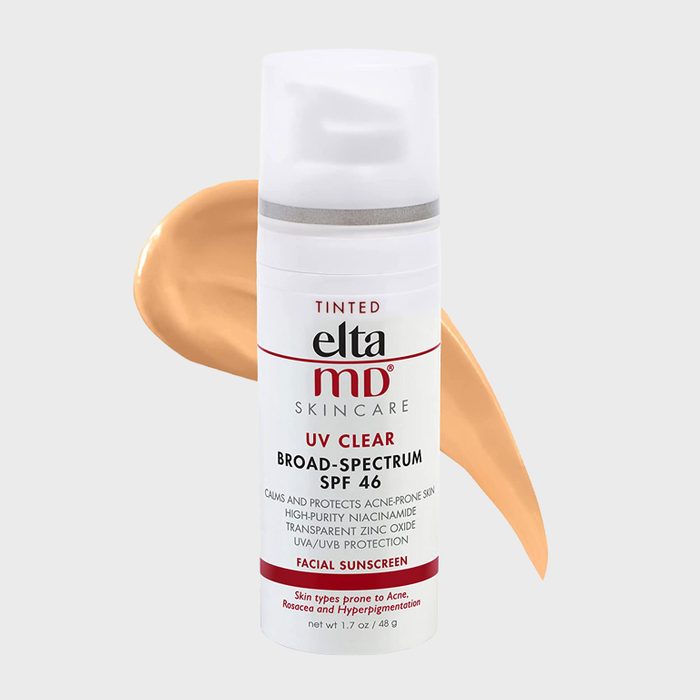
Pros:
Cons:
Beloved by dermatologists and beauty lovers alike, Elta MD’s tinted sunscreen is a mineral-based face sunscreen with a tint. The oil-free and fragrance-free moisturizer helps to soothe sensitive skin types, won’t cause breakouts and includes hyaluronic acid to help hold in moisture. Elta MD is great for all skin types, whether you’re a little oily or a bit sensitive, and the tint effortlessly blends, helping to color correct and even your skin tone. P.S. Your face isn’t the only place you should be applying sunscreen—get one for your scalp, too.
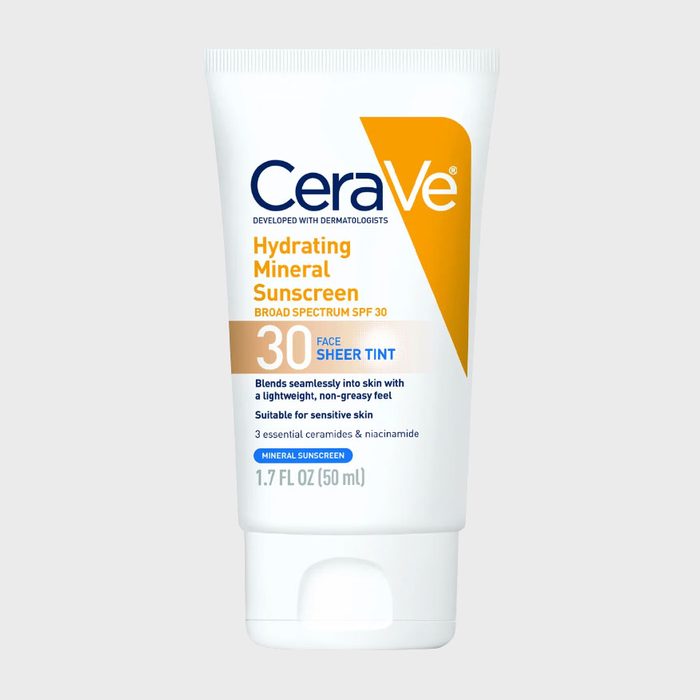
Pros:
Cons:
CeraVe’s 100% mineral sunscreen blends easily into a range of skin tones without leaving a cast. The hydrating sunscreen’s tint excels at evening out the skin, making it a great primer with SPF or even the perfect tinted moisturizer to wear on its own. Oil free and non-comedogenic, it contains hyaluronic acid and ceramides to help boost moisture and protect the skin barrier.
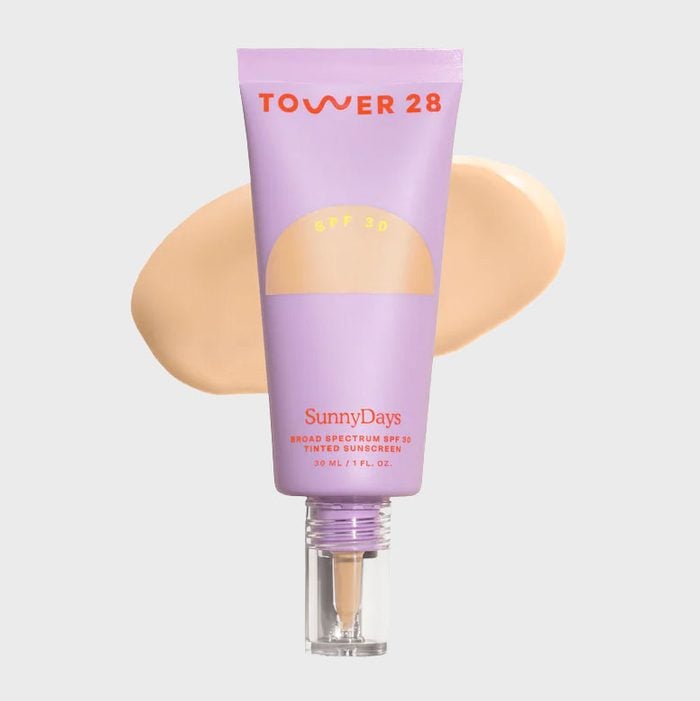
Pros:
Cons:
Tower28 Beauty’s mineral sunscreen is fragrance free and offers buildable coverage, acting like your foundation while providing much-needed SPF. Safe for sensitive skin, this natural sunscreen helps to even out redness and protect from sun damage while providing a natural, non-greasy finish. It’s non-white casting and non-oxidizing, creating a flawless finish for most skin types. Psst! Prefer sunscreen sticks instead? We’ve got you covered.
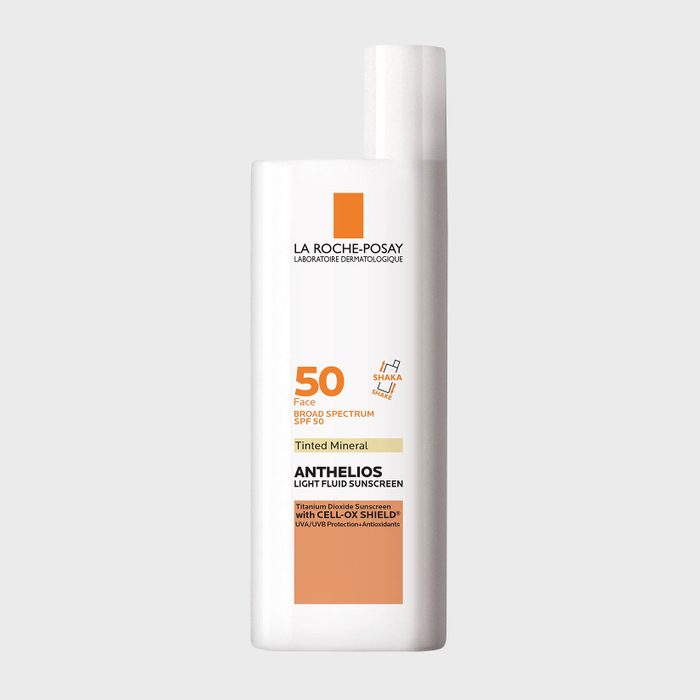
Pros:
Cons:
La Roche-Posay’s tinted sunscreen is a best-selling, dermatologist-loved product with a universal tint, ensuring no white cast is left behind. With high UVA and UVB protection as well as a fast-absorbing, matte dry-down, the sunscreen’s glowing reviews are there for a reason. Great for sensitive skin, this non-greasy tinted SPF works under makeup or on its own. Use a simple face wash to remove the tinted sunscreen from your face at the end of the day.
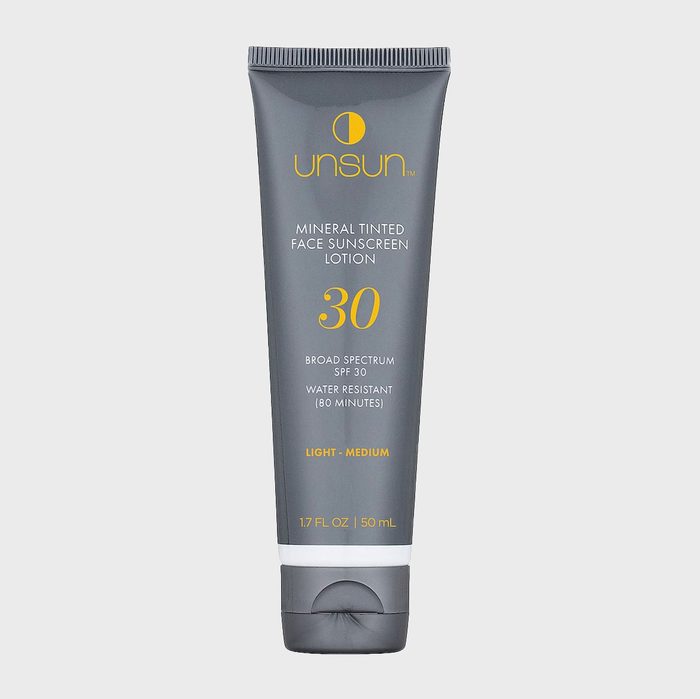
Pros:
Cons:
The best-selling tinted sunscreen from Unsun is a mineral sunscreen primer and color corrector all in one. This female-founded brand sells products for people of color who lack good options for SPF that don’t leave behind a white residue. Use the cruelty-free and vegan lotion alone or under makeup. It also helps to fight free-radical stressors while protecting your skin.
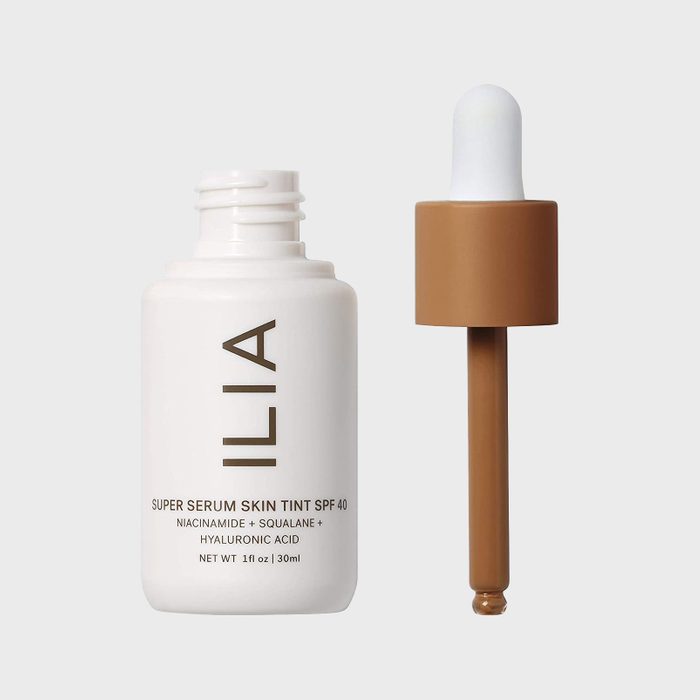
Pros:
Cons:
Ilia’s Super Serum Skin Tint fuses skincare, makeup and sunscreen into one step, allowing for SPF protection and easy coverage. The lightweight coverage includes SPF 40 with non-nano zinc oxide to help shield skin from UVA, UVB, UVC, blue light and pollution. Plus, the addition of niacinamide, squalane and hyaluronic acid helps to lock in moisture, creating a dewy appearance.
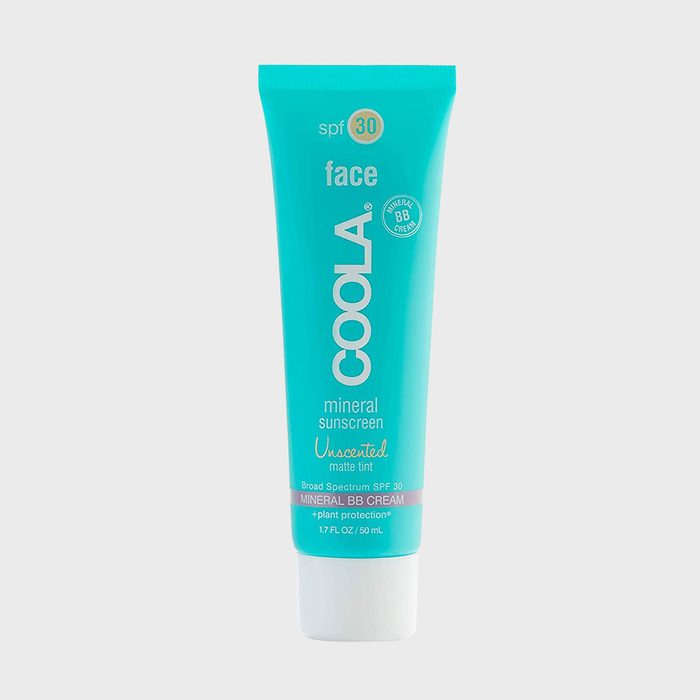
Pros:
Cons:
Coola is known for creating great SPF for a variety of skin types, and their organic mineral sunscreen is no different. For those with oily skin, this option helps to smooth fine lines and wrinkles while also drying down to a matte finish. With a light tint, you can think of this SPF as a natural BB cream, allowing for protection and evening out skin tone without an oily or greasy feel.
SPF tells you how well a sunscreen can protect your skin from the sun’s UVB rays. For example, SPF 30 blocks about 97% of UVB rays. SPF 50 offers more protection, blocking 98% of UVB rays. In addition to SPF, there is also broad-spectrum protection, which refers to sunscreens that protect your skin from both UVA and UVB rays. UVB rays are responsible for sunburn, while UVA is the main cause of premature aging of the skin since it can penetrate deeper to cause damage. Ideally, a tinted sunscreen offers both forms of protection, so look for a broad spectrum with at least an SPF rating of 30.
When choosing a tinted sunscreen, find a shade that matches your skin tone for a more natural finish. Most tinted sunscreen brands are available in multiple shades. Picking the right one for your skin can help even your skin tone, cover small imperfections and give you a healthy glow. The blending ability is also important; it should spread easily and absorb into the skin without leaving streaks or caking. Your tinted sunscreen should feel light and look natural.
The ingredients in a tinted sunscreen vary on the type of sunscreen formula.
Due to the different types of ingredients used in tinted sunscreens, it’s a good idea to consider your skin type to ensure optimal performance and effectiveness.
Tinted sunscreens come in multiple finishes and coverage levels to suit different skin preferences. Finishes can range from matte, which can help control shine for a smoother appearance, to dewy for a more glowing and hydrated look.
Coverage also varies from lightweight, natural-looking sheer formulas to more medium or full coverage that can help conceal blemishes and even out skin tone.
How a tinted sunscreen feels on your skin throughout the day can impact your comfort. Lightweight formulas are usually preferred because they absorb quickly into your skin and don’t feel heavy or greasy.
There’s often a choice of textures, too, such as creamy formulas that provide a rich moisturizing feel, which is great for dry skin. There are also liquid formulas that are lighter and more fluid, so they’re ideal for oily skin types.
In addition to sun protection, many tinted sunscreens offer other benefits to help with your overall skin health.
If you spend a lot of time outdoors or enjoy swimming, a water-resistant tinted sunscreen can offer long-lasting protection against UV rays even if you’re exposed to water or sweating. Most sunscreens are water resistant for around 40 to 80 minutes, so it’s important to check the level for how long the water resistance lasts.
It’s also important to remember that “water-resistant” is not the same as “waterproof,” so reapplication is essential to ensure continuous protection.
When selecting a tinted sunscreen, ingredient safety is something worth considering. Reef-safe formulas protect marine ecosystems by avoiding harmful chemicals like oxybenzone and octinoxate, which can damage coral reefs. Choosing reef-safe sunscreens ensures that your sun protection is environmentally friendly. Also, clean beauty products use non-toxic, natural ingredients while avoiding potentially harmful additives like parabens, sulfates and synthetic fragrances.
Look for products with user-friendly designs, such as pump bottles or tubes with built-in applicators, which allow for precise and hygienic application. Compact, travel-sized packaging is ideal for on-the-go use and ensures that you can easily carry your sunscreen wherever you need it. Keeping portability in mind helps ensure you can maintain sun protection throughout the day.
Before deciding on tinted sunscreen, do a trial to ensure it suits your skin — especially if you have sensitive skin. A patch test can help identify an allergic reaction by using a small amount on a discrete area, like behind your ear.
If you can get a sample, you’ll be able to test the product before committing to a full-size bottle. This is a great way to make an informed decision about the best tinted sunscreen for your skin.
Rachel Adler is a beauty, fashion and lifestyle expert with over 15 years of uncovering the best products. Her experience ranges from digital media to long-form editorial content and more. With Rachel’s expertise, our team has years of experience finding the best products for all price points, including the best tinted sunscreens. We tested many ourselves, researched the best brands to buy from and considered thousands of customer reviews for each pick. We then compiled this list with products across all price points and listed picks suitable for every skin type.
We consulted Dr. Sarina Elmariah, a board-certified dermatologist and co-founder of Aramore. Dr. Elmariah is also a neuroscientist who assists patients with conditions such as non-melanoma and melanoma skin cancer management, allergies and chronic itching disorders. She performs clinical studies and research to learn more about skin sensitivities, information and aging. Dr. Elmariah has been published in multiple publications, including the Journal of the American Academy of Dermatology, Shape, O (Oprah), Women’s Health, Reader’s Digest and more.
Paul Rankin, Content Updates Editor at Reader’s Digest, updated and contributed research to this article. Paul is a former commerce editor at Bob Vila and has written shopping guides since 2021.
We sought advice from a dermatologist to establish our top priorities for what to look for when creating our list of top tinted sunscreens. We included a range of options for physical, chemical and hybrid formulas to suit a range of skin types and preferences. We then considered skin types, with options for dry, oily and particularly sensitive skin. All of our favorites in this list offer excellent SPF ratings to help keep skin protected against UV rays while adding other benefits like additional coverage of blemishes or evening out the skin tone for a more refined look. Many of our picks also offer additional skin benefits, such as antioxidants, anti-aging agents and brightening agents, to provide shoppers with a solid lineup.
We love the Elta MD UV clear facial sunscreen. It’s lightweight, easy to apply and dries quickly for a non-greasy finish. It’s also non-comedogenic and fragrance-free, so it won’t interfere with your other skincare products.
Tinted sunscreens do a great job protecting your skin from harmful UV rays. For best protection, use one with a minimum SPF rating of 30 and reapply it throughout the day.
Yes, tinted sunscreens provide the same powerful protection as regular sunscreen. Dr. Elmariah notes that “tinted sunscreens typically contain minerals such as zinc oxide or titanium dioxide, which offer protection from ultraviolet (UV) and blue light. Because mineral-based sunscreens can cause an undesirable white cast once applied to the skin, some formulators add pigments to help offset this effect. The addition of pigment does not ‘dilute’ the efficacy of the SPF. What’s more important is to know the SPF of any specific product because this reflects what has been tested in the final formulation.”
To help prevent skin cancer, Dr. Elmariah recommends a minimum of SPF 30 for daily use, and that protection can be from a traditional SPF or tinted SPF.
Depending on your makeup needs, a tinted sunscreen can be all you need. Since the light pigment in a tinted sunscreen offsets a white cast and any small imperfections, it is a good light-coverage option. But an additional foundation might be necessary if you’re looking for heavier coverage. You can also apply self-tanning drops for a natural-looking tan underneath the sunscreen.